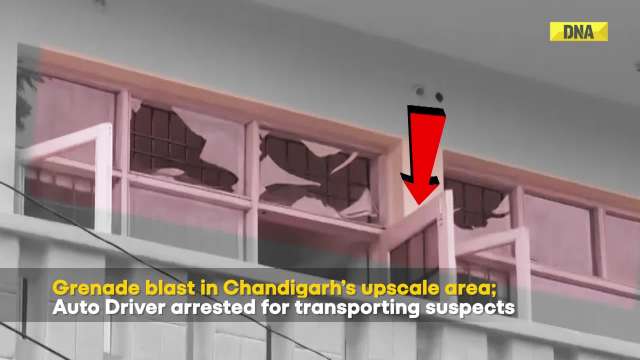Precision-guided, 13,636kg Massive Ordnance Penetrator is designed to destroy potential targets such as deeply buried facilities that are beyond the reach of existing penetrating bombs.
A "bunker buster" bomb with more than 10 times the explosive power of its predecessor is to be put into service by the United States next December, six months later than previously scheduled, the Defense Department told Reuters on Friday.
The deployment's timing may help shape new calculations in long standoffs with Iran and North Korea over their nuclear programmes, much of which are believed to be underground to avoid detection and enhance their chances of surviving an attack.
The precision-guided, 30,000-pound (13,636kg) Massive Ordnance Penetrator, or MOP, is designed to destroy potential targets such as deeply buried facilities that are beyond the reach of existing penetrating bombs.
"Funding delays and enhancements to the planned test schedule have pushed the capability availability date to December 2010," Tara Rigler, a Pentagon spokeswoman, said in an email.
Congress agreed to a Pentagon request, made public in August, to shift fiscal 2009 budget funds to speed the Boeing Co-built bomb's tie-in to the radar-evading B-2 bomber, the most advanced in the US arsenal.
At the time, Andy Bourland, an Air Force spokesman, had said B-2, built by Northrop Grumman Corp., would be capable of carrying the bomb by July 2010.
In disclosing the new deployment target, the Defense Department specified it did not plan to use older B-52 Stratofortress bombers as an "operational delivery platform" for the MOP, which will be the largest US non-nuclear bomb.
It is designed to penetrate up to 200 feet (61 metres) underground before exploding, according to an article published by the Air Force.
MOP testing is being carried out by the Air Force and the Defense Threat Reduction Agency, which is responsible for safeguarding the United States and its allies from weapons of mass destruction.
The bomb's fourth flight test was successfully completed on Tuesday at White Sands Missile Range in White Sands, New Mexico, using a B-52 and an "inert" MOP, Rigler said.
The Obama administration has given Iran until the end of this month to respond positively to United Nations-drafted proposals aimed at curbing its nuclear program or face a new round of punishing international sanctions.
Tehran is at odds with the West over its declared plan to use enriched uranium to generate power, a program Washington and its allies assert is a mask for eventual production of a nuclear weapon.
The MOP's planned deployment "amounts to a message to Iran," said Kenneth Katzman, an Iran expert for the US Congress. "It cannot count on the main elements of its nuclear programme surviving if there is a conflict."
Israel, widely thought to have the Middle East's only atomic arsenal, argues Iran could have a nuclear bomb by 2010 and says it would threaten the existence of the Jewish state.
Military analysts doubt Israel could disable Iran's nuclear facilities in a raid even with dozens of aircraft. Tehran has had years to build covert facilities, spread elements of its programs and develop options for recovering from an attack.
"Strong as Israeli forces are, they lack the scale, range and other capabilities to carry out the kind of massive strike the US could launch," Anthony Cordesman, a former Pentagon strategist now at the Center for Strategic and International Studies, wrote in September.
The MOP also may alter the calculus of North Korea, which carried out its second underground nuclear test blast in May.
President Barack Obama sent a personal letter to North Korean leader Kim Jong-il this month amid efforts to persuade Pyongyang to return to six-party disarmament talks with the United States, China, Japan, Russia and South Korea.
The MOP packs some 5,300 pounds (2,404kg) of explosives, more than 10 times the amount of its predecessor bunker buster, the 2,000-pound (907kg) BLU-109, according to the threat reduction agency, which funded its development.
In a July 8 funding acceleration request to Congress, the Defense Department said the MOP was the "weapon of choice" to meet an urgent operational need. It cited requests from the US Pacific Command, which takes the lead in US military planning for North Korea, the Central Command, which plans for Iran contingencies, as well as the Strategic Command, which deals with the long-range US arsenal.
The MOP would be about one-third heavier than the 21,000-pound (9,500kg) GBU-43B Massive Ordnance Air Blast bomb, previously dubbed the "mother of all bombs."
![submenu-img]() ‘Body dismembered, pureed in blender’: Former model gets brutally murdered by her husband after..
‘Body dismembered, pureed in blender’: Former model gets brutally murdered by her husband after..![submenu-img]() Venom The Last Dance trailer: Tom Hardy channels Tom Cruise, battles boss symbiote Knull, fans say 'it will be a blast'
Venom The Last Dance trailer: Tom Hardy channels Tom Cruise, battles boss symbiote Knull, fans say 'it will be a blast'![submenu-img]() Meet man who once lost Rs 1.27 lakh crore in a day, today owns giant e-commerce business worth crores, he is…
Meet man who once lost Rs 1.27 lakh crore in a day, today owns giant e-commerce business worth crores, he is…![submenu-img]() Katy Perry, Orlando Bloom share steamy kiss at MTV Video Music Awards 2024; video goes viral
Katy Perry, Orlando Bloom share steamy kiss at MTV Video Music Awards 2024; video goes viral![submenu-img]() 'Ready to resign...': CM Mamata Banerjee as junior doctors continue protest over Kolkata rape-murder case
'Ready to resign...': CM Mamata Banerjee as junior doctors continue protest over Kolkata rape-murder case![submenu-img]() बातचीत के लिए नहीं पहुंचे हड़ताली डॉक्टर, भावुक CM ममता बोलीं- मैं इस्तीफा देने को तैयार
बातचीत के लिए नहीं पहुंचे हड़ताली डॉक्टर, भावुक CM ममता बोलीं- मैं इस्तीफा देने को तैयार![submenu-img]() UP BJP में बड़ा फेरबदल, सीएम Yogi Adityanath ने एक साथ बदले 75 जिलों के प्रभारी मंत्री, केशव प्रसाद मौर्य को मिली ये जिम्मेदारी
UP BJP में बड़ा फेरबदल, सीएम Yogi Adityanath ने एक साथ बदले 75 जिलों के प्रभारी मंत्री, केशव प्रसाद मौर्य को मिली ये जिम्मेदारी![submenu-img]() मथुरा से आगरा तक बारिश का कहर, धंसी सड़कें और गिरे पुल, 7 लोगों की मौत, स्कूल इतने दिन के लिए बंद
मथुरा से आगरा तक बारिश का कहर, धंसी सड़कें और गिरे पुल, 7 लोगों की मौत, स्कूल इतने दिन के लिए बंद![submenu-img]() UP Bypolls: सपा-कांग्रेस में कैसे होगा सीटों का बंटवारा, अखिलेश यादव ने बताया पूरा प्लान
UP Bypolls: सपा-कांग्रेस में कैसे होगा सीटों का बंटवारा, अखिलेश यादव ने बताया पूरा प्लान![submenu-img]() तानाशाह परवेज मुशर्रफ के बाद यूपी में अब पाकिस्तान के पहले प्रधानमंत्री की जमीन होगी नीलाम, जानें कहां है ये 570 बीघा जमीन
तानाशाह परवेज मुशर्रफ के बाद यूपी में अब पाकिस्तान के पहले प्रधानमंत्री की जमीन होगी नीलाम, जानें कहां है ये 570 बीघा जमीन![submenu-img]() ‘30 LPA, 3BHK, no in-laws’: Woman earning Rs 1.32 lakh salary lists demands for future husband, netizens say...
‘30 LPA, 3BHK, no in-laws’: Woman earning Rs 1.32 lakh salary lists demands for future husband, netizens say...![submenu-img]() In a big EV push, Centre launches Rs 10900 crore PM E-Drive scheme to replace…
In a big EV push, Centre launches Rs 10900 crore PM E-Drive scheme to replace…![submenu-img]() World’s longest car has helipad, swimming pool, mini-golf course, can seat over…; it cost…
World’s longest car has helipad, swimming pool, mini-golf course, can seat over…; it cost…![submenu-img]() This car sets new Guinness world record for becoming longest driving EV on a single charge; it cost Rs…
This car sets new Guinness world record for becoming longest driving EV on a single charge; it cost Rs…![submenu-img]() MG Windsor EV launched in India: Check price, features, design of India’s first ‘CUV’
MG Windsor EV launched in India: Check price, features, design of India’s first ‘CUV’![submenu-img]() Meet woman, who belongs to tribal family, cracked UPSC exam in fourth attempt, became IAS officer with AIR...
Meet woman, who belongs to tribal family, cracked UPSC exam in fourth attempt, became IAS officer with AIR...![submenu-img]() Meet woman who cracked UPSC in 1st attempt without coaching, became IPS at 22, but resigned after 4 years due to...
Meet woman who cracked UPSC in 1st attempt without coaching, became IPS at 22, but resigned after 4 years due to...![submenu-img]() Meet genius, an Indian who worked with IIT, had NASA connection, went missing and was found years later in...
Meet genius, an Indian who worked with IIT, had NASA connection, went missing and was found years later in...![submenu-img]() Meet man, who lost eyesight at 8, got record-breaking job offer after graduation, not from IIT, NIT, salary is Rs...
Meet man, who lost eyesight at 8, got record-breaking job offer after graduation, not from IIT, NIT, salary is Rs...![submenu-img]() Meet woman, IAS Tina Dabi's friend who cracked UPSC exam in first attempt without coaching, secured AIR...
Meet woman, IAS Tina Dabi's friend who cracked UPSC exam in first attempt without coaching, secured AIR...![submenu-img]() Malaika Arora Father Death: Anil Mehta's Final Words To His Daughter Malaika Arora
Malaika Arora Father Death: Anil Mehta's Final Words To His Daughter Malaika Arora![submenu-img]() Chandigarh Blast: Grenade Explosion In Sector 10; Auto Driver Arrested, Investigation Ongoing
Chandigarh Blast: Grenade Explosion In Sector 10; Auto Driver Arrested, Investigation Ongoing![submenu-img]() BSF Jawan Injured As Pakistan Violates Ceasefire Near LoC Days Before Jammu Kashmir Elections 2024
BSF Jawan Injured As Pakistan Violates Ceasefire Near LoC Days Before Jammu Kashmir Elections 2024![submenu-img]() Rahul Gandhi US Visit: Rahul Gandhi Criticizes BJP And RSS At National Press Club, US | INDIA
Rahul Gandhi US Visit: Rahul Gandhi Criticizes BJP And RSS At National Press Club, US | INDIA![submenu-img]() Kolkata Doctor Case: ED Reveals Properties Of RG Kar Ex-Principal Sandip Ghosh Found In Raids
Kolkata Doctor Case: ED Reveals Properties Of RG Kar Ex-Principal Sandip Ghosh Found In Raids![submenu-img]() Meet man who once lost Rs 1.27 lakh crore in a day, today owns giant e-commerce business worth crores, he is…
Meet man who once lost Rs 1.27 lakh crore in a day, today owns giant e-commerce business worth crores, he is…![submenu-img]() Meet woman, popular TV actress who left acting to build Rs 820 crore company from scratch, she owns one of famous…
Meet woman, popular TV actress who left acting to build Rs 820 crore company from scratch, she owns one of famous…![submenu-img]() Eastman Strengthens Leadership team, Charts Course for a New Future
Eastman Strengthens Leadership team, Charts Course for a New Future![submenu-img]() Emotional Intelligence for Entrepreneurs: A Key to Business Success
Emotional Intelligence for Entrepreneurs: A Key to Business Success![submenu-img]() Meet Pakistan’s richest man with Rs 111674 crore net worth, owns Jacksonville Jaguars and luxury properties
Meet Pakistan’s richest man with Rs 111674 crore net worth, owns Jacksonville Jaguars and luxury properties![submenu-img]() AI Insights: Top 7 high-paying jobs in India by 2050
AI Insights: Top 7 high-paying jobs in India by 2050![submenu-img]() Streaming This Week: Sector 36, Berlin, Khalbali Records, Mr Bachchan, latest OTT releases to binge-watch
Streaming This Week: Sector 36, Berlin, Khalbali Records, Mr Bachchan, latest OTT releases to binge-watch![submenu-img]() Meet Rishi Kapoor's heroine who became star with hit debut, quit films after continuous flops; left India to live in...
Meet Rishi Kapoor's heroine who became star with hit debut, quit films after continuous flops; left India to live in...![submenu-img]() India's most successful star kid gave blockbusters at 25, bigger than superstar dad; not Ranbir, Hrithik, Salman, Alia
India's most successful star kid gave blockbusters at 25, bigger than superstar dad; not Ranbir, Hrithik, Salman, Alia![submenu-img]() Meet India's most unsuccessful actor, has 180 flops, no hit since 1998, still a superstar; not Govinda, Akshay, Salman
Meet India's most unsuccessful actor, has 180 flops, no hit since 1998, still a superstar; not Govinda, Akshay, Salman ![submenu-img]() 'Ready to resign...': CM Mamata Banerjee as junior doctors continue protest over Kolkata rape-murder case
'Ready to resign...': CM Mamata Banerjee as junior doctors continue protest over Kolkata rape-murder case![submenu-img]() Gaurs Group Conducts Live Lottery for 3X Over-subscribed project- Gaur NYC Residences
Gaurs Group Conducts Live Lottery for 3X Over-subscribed project- Gaur NYC Residences![submenu-img]() LAWA Global Innovations: Where Adventure Meets Passion Through a Dynamic Husband-and-Wife Duo
LAWA Global Innovations: Where Adventure Meets Passion Through a Dynamic Husband-and-Wife Duo![submenu-img]() Who is Premanand Maharaj, AI victim whose voice is being used for...
Who is Premanand Maharaj, AI victim whose voice is being used for...![submenu-img]() Kerala: Professor collapses and dies during Onam celebrations at college after…
Kerala: Professor collapses and dies during Onam celebrations at college after…













































)
)
)
)
)
)
)
)
)
)
)
)
)
)





)
)
)
)
)
)